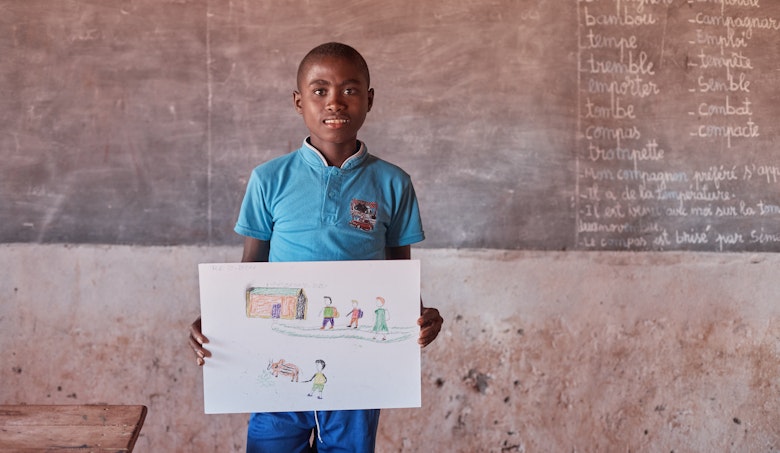Messi: “Education is so important to me because I learn so many things at school.”
16-year-old Messi has been working in the mica mines since he was 10 years old. Due to poverty, he had to join his parents at the mica mines to help them sell more mica and put food on the table. Sadly, Messi developed coughs while working there and his health deteriorated over the years. Luckily, he was identified and rescued from that devastating life. He now attends school, has time to play, and his health has improved.
Life at home
Messi is the second born of eight siblings. He lives with his parents in a house made of mud, with bushes as the roof in Benato, Madagascar. Their house has two rooms out of which one is a kitchen and the other is the bedroom where they all sleep. They have a yard with a playground and a pump in the surrounding area, and the house is also surrounded by cacti fences.
Working in the mica mines
Messi's parents depended on farming for the family’s upkeep but the unreliable rainfall pushed them into mica mining. All their children had to work in the mines once they attained the age of 10. When Messi turned 10, he would often miss school to work in the mica mines and support his parents so they could get more mica to sell. They would earn approximately 1.7 to 2 euros per day if the quarries are good. He would wake up at 6 am, wash up and make his way to the mines, often without breakfast. He developed coughs from the dust and often got very tired. Working in the mines with little food to eat and hazardous work also affected his growth, and he was not able to grow further in height. “It was difficult but there was nothing else I could do, my parents needed me,” Messi narrated.
Supported to go to school
After years of suffering in the mica mines, Messi’s life changed when he was identified by a field staff of FAFAFI in February 2022 as they were raising awareness about child labour and the importance of education. He was identified as a victim of child labour and it was important to withdraw him from the mines and take him to school regularly. Through the FAMAHA project, Messi received school supplies, specifically a backpack, pens and copybooks. In addition, he received lunch every day at school as part of the support for the 167 children beneficiaries of the FAMAHA project.
Messi’s New Routine
Now, Messi wakes up at 6 am, washes up, and takes breakfast unlike before as his parents can now afford the meal since Messi's lunch is catered for by the project. He then plays football and goes to school at 10:30 am and joins the other students for lunch. After lunch, Messi starts half-day school at 12:30 pm where they read, write, study Malagasy, science, geography, history, maths, and French.
“Education is so important to me because I learn so many things at school like child rights and calculation,” Messi said. During breaks, Messi often plays football with his peers, and sometimes they play with marbles. School sessions end at 5 pm and Messi goes back home to help his family by pounding peanuts and rice, fetching water, and sometimes talking about rights and the bad effects of violence with his friends. Often, they eat maize as dinner and afterwards, he revises his lessons and sleeps.
Improved Family life
Messi now attends school regularly and eats three meals a day. His family received training from the FAMAHA project and are now growing greens, pumpkins, and onions They also received chicken to breed and multiply. His parents have been able to improve their home by adding an extra room and also building a latrine made of mud. Messi no longer has coughs and his health is gradually improving.
Messi said, “My situation has gotten better; there are no worries in going to school as I have school supplies and I can eat breakfast at home and lunch at school. My mother doesn’t have to worry about lunch now and focuses more on growing greens.” FAMAHA project team makes regular follow-ups to ensure Messi attends school and receives his lunch.
Promising Future
Messi knows exactly what he wants to achieve in his promising future. “I really like to play football. I want to be like Messi. He’s so skilled. I like to study too,” he said joyfully. “When I get out of this difficult situation when I finish my studies, I will open a retail shop so I can provide for my many younger siblings and my mother,” he concluded.

